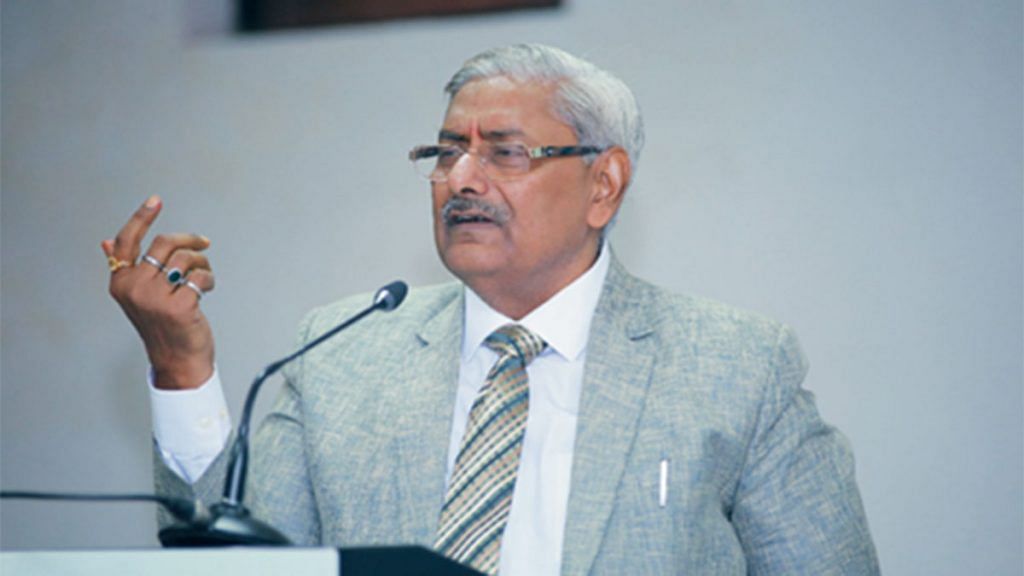New Delhi: In a crucial verdict relating to compensation under the Land Acquisition Act, a five-judge Constitution bench of the Supreme Court headed by Justice Arun Mishra Friday upheld an earlier verdict that proceedings will not lapse if compensation has been deposited in the treasury, not requiring an actual payment to the landowner or court.
The earlier judgment was delivered by a three-judge bench headed by Justice Mishra himself in 2018.
Recently, Justice Mishra was accused of ‘conflict of interest’ by farmer associations, who wrote to the Chief Justice of India objecting to his presence on the five-judge bench hearing the matter.
Importance of Friday’s verdict
The Friday verdict was on the interpretation of Section 24 of the Right to Fair Compensation and Transparency in Land Acquisition, Rehabilitation and Resettlement Act, 2013. It aimed to clear the air over two contradictory judgements, delivered in 2014 (Pune municipality case) and 2018 (Indore development case), over whether land acquired by the government would lapse if it fails to deposit the compensation within five years in the bank account of the landowners.
The top court held that landowners cannot insist that the amount should be deposited in court, so as to sustain the land acquisition proceedings under the old act on the commencement of the new land acquisition law with effect from 1 January 2014.
The five-judge bench also had Justices Indira Banerjee, Vineet Saran, M.R. Shah and S. Ravindra Bhat, and said its verdict would ensure, for example, that no one can reopen the acquisition of land on Raisina Hill, the seat of the government of India.
“Deposit in treasury in place of deposit in court causes no prejudice to the landowner or any other stakeholder as their interest is adequately safeguarded by the provisions contained in Section 34 of the Act of 1894, as it ensures higher rate of interest than any other government securities,” the court ruled.
The five-judge bench also stated that the land owners cannot say in court that proceedings have lapsed if the government has rendered the amount of treasury. Thus there was no need to actually deposit the amount with landowners or court.
Also read: Will apologise 100 times with folded hands: Justice Mishra after ‘contempt threat’ to lawyer
The controversy
The issue had snowballed into a controversy in 2018, when the three-judge Supreme Court bench headed by Justice Mishra overruled a judgment passed by another three-judge bench of the court in 2014.
Back then, in a relief for landowners, a three-judge bench of the apex court headed by Justice R.M. Lodha, in the Pune Municipal Corporation v Harakchand Misirimal Solanki case, held that acquisition proceedings initiated under the 1894 Act, which were initiated five years before the 2013 law was enacted, would lapse if the land in question was not taken control of, or if compensation was not paid to displaced farmers.
However, in 2018, the three-judge bench of Justices Arun Mishra, Adarsh Kumar Goel and Mohan Shantanagoudar declared the previous bench’s judgment “per incuriam”, in the Indore Development Authority v Shailendra (D) Through LRS & Ors case. This verdict came as a relief for developers.
In 2018, Justice Mishra held that if a landowner refuses to accept the compensation offered by the developer, they cannot take advantage of their own wrongdoing and have the acquisition proceedings lapse under the old law.
A judgment can be declared “per incuriam” if it does not follow a statutory provision or a binding precedent that may have been relevant. It literally translates to “through lack of care”. In such scenarios, a judgment can be declared to be without any legal force, and is then not treated as a valid precedent.
Days after the 2018 judgment, another three-judge bench comprising Justices M.B. Lokur, Kurian Joseph and Deepak Gupta stayed the operation of the Indore Development Authority judgment.
It ruled that a three-judge bench cannot overrule another three-judge bench verdict, and hence, this question needed to be decided by a larger bench.
Following this, the case was heard in October 2019, by a five-judge bench headed by Justice Mishra.
Also read: PM Modi is versatile genius, internationally acclaimed visionary: Justice Arun Mishra
‘Conflict of interest’ charge
However, before the regular hearings could commence, two farmer associations wrote to the Chief Justice of India, objecting to Justice Mishra hearing the matter, despite him having already expressed his opinion in the 2018 judgment.
In their letters, the All India Farmer Association and the Delhi Grameen Samaj highlighted the fact that Justice Mishra would have a conflict of interest in deciding the case.
Justice Mishra held hearings for up to a week to understand why he should recuse, and later ruled that he would not recuse and the case would be heard by him. This verdict was unanimous among the five judges.
